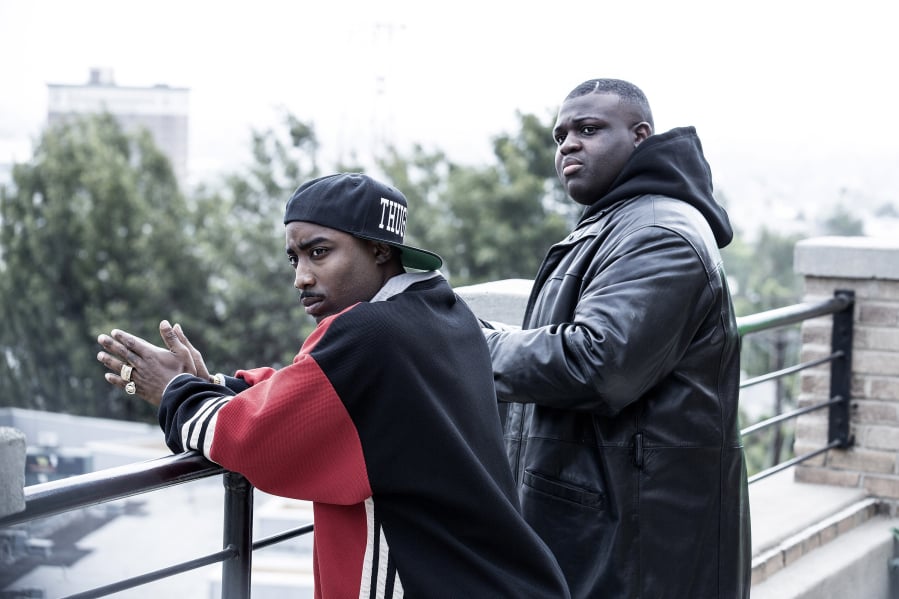Faded 1990s headlines continue to feed the beast of peak TV, stirred up a couple of years ago by FX’s retelling of O.J. Simpson’s murder trial as a limited drama series.
A parade of similar projects has followed, with series about the Unabomber (from National Geographic Channel), the Menendez brothers (NBC), Andrew Cunanan (FX) and David Koresh (Paramount Network). Projects in the works include the dramatizing of Prince Charles and Diana’s marital collapse and Linda Tripp’s betrayal of Monica Lewinsky’s girl code.
But do you ever get the feeling that networks get more bang from announcing these shows than from making them? Wanting its own turn at the genre, USA has put significant resources into “Unsolved: The Murders of Tupac and the Notorious B.I.G.,” an impressive yet meandering 10-episode series that premiered Tuesday night.
Here, at least, your television critic can for once enjoy not being Mr. ’90s Know-It-All and see things from the relatively naive perspective of a younger audience. My memories of the September 1996 slaying of rap star Tupac Shakur in Las Vegas, followed by the killing of his frenemy, the Notorious B.I.G. (a.k.a. Biggie Smalls, whose real name was Christopher Wallace), in Los Angeles six months later, are at best vague. The music remains loud and clear while the facts get fuzzier.
I doubt I’m alone. To be an expert in these particular events requires a war historian’s grasp of East-West gangsta rap rivalries and competing conspiracy theories — and, as “Unsolved” strongly suggests, a willingness to see these killings less as prophetic manifestations of pop-culture legend and more as the tragic loss of two extremely talented young men.
In that regard, “Unsolved,” created by Kyle Long (“Suits”) and produced and directed by Anthony Hemingway (who worked on FX’s “People v. O.J.” series) is a compelling success, especially once you get past a clunky first episode that is burdened with expository dialogue and confusing swerves on a narrative timeline that spans two decades.
The series takes time to demythologize Shakur and Biggie (played here with respectful and fascinating accuracy by Marcc Rose and Wavyy Jonez) just enough, so that they can be seen as victims in need of overdue justice. As recounted here, their cases have been botched time and again by the Los Angeles Police Department, which was stymied by uncooperative witnesses and false leads — among other concerns.
The series draws on former LAPD detective Greg Kading’s book about the investigation; Josh Duhamel (lately of “Taco Bell: Web of Fries”) stars as Kading, who is asked by his superiors in 2006 to reopen Biggie’s never-solved slaying.
City officials, hoping to stave off a costly lawsuit brought by Biggie’s mother, Voletta Wallace (“Underground’s” Aisha Hinds), give Kading wide latitude, allowing him to form a task force that includes federal and local departments, including “Fargo’s” Bokeem Woodbine as Kading’s trusted colleague and “Treme’s” Wendell Pierce as a dubious detective from the sheriff’s office.
Toggling between 2006 and 1997, the story also focuses on the work of police detective Russell Poole (“Westworld’s” Jimmi Simpson), who defied his bosses to pursue a connection between Biggie’s and Shakur’s deaths and the rumors that LAPD officers, who were moonlighting as security for Death Row Records, carried out both killings on orders from producer-label executive Marion “Suge” Knight (Dominic L. Santana).
Or something like that. Even with a disclaimer at the end of each episode saying that some liberties have been taken with facts, “Unsolved,” like its kin, is constantly tempting the viewer to reach for Google. But rather than take that bait, this time I simply let the series unspool, hoping to judge “Unsolved” mainly as entertainment rather than inquest.
That turned out to be a wise move. Free of fact-checking chores, “Unsolved” does fine by luring viewers along as a decently written and well-acted crime procedural.
Without knowing what’s in store for the last three episodes, I would only carp that the series struggles to make room for its other flashbacks, earlier in the ’90s, that examine the friendship and falling-out between its title characters. These glimpses of Tupac and Biggie’s final days can unfortunately seem nominal.
Reducing the rap stars’ lives to fleeting moments of revelry and recompense would seem like a necessary edit in a series obsessed with the crime solvers rather than the crime victims.
But somewhere in “Unsolved’s” sprawling and sometimes redundant episodes, it would be nice to dwell a bit more in Tupac’s and Biggie’s brief and needlessly violent heyday.



